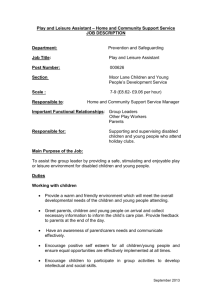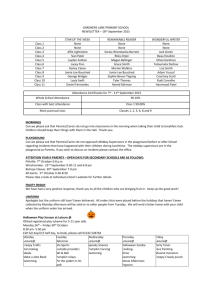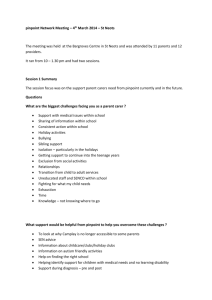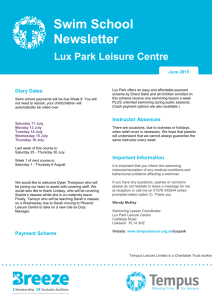p: 0751 741 9761 e: getinvolved@pinpoint
advertisement
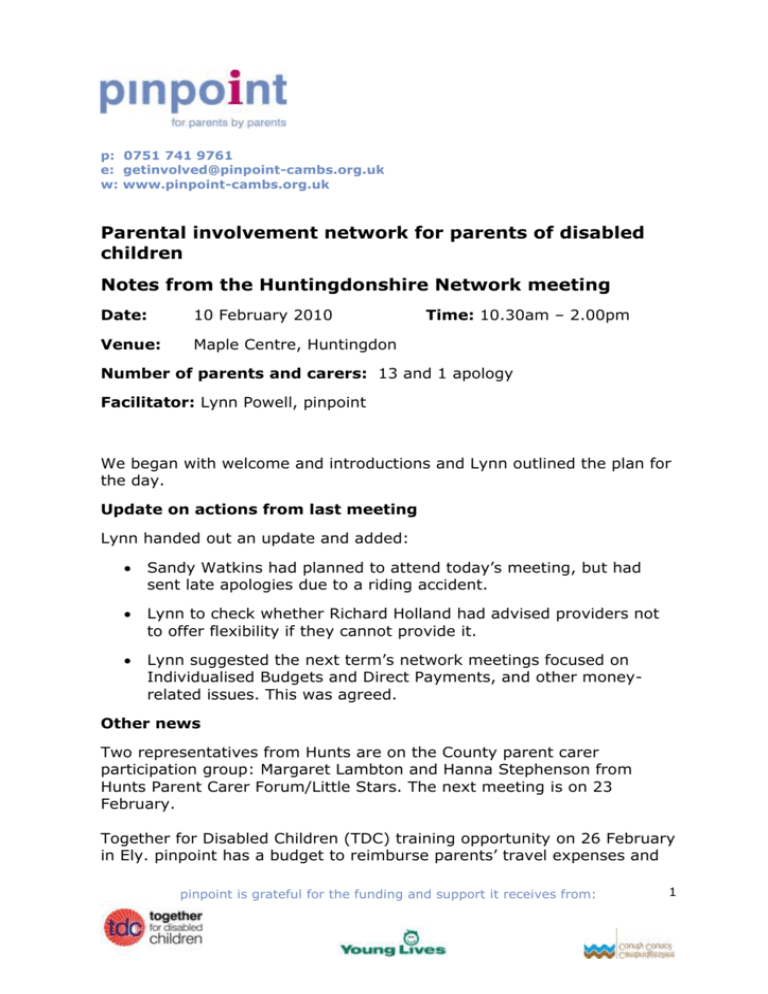
p: 0751 741 9761 e: getinvolved@pinpoint-cambs.org.uk w: www.pinpoint-cambs.org.uk Parental involvement network for parents of disabled children Notes from the Huntingdonshire Network meeting Date: 10 February 2010 Venue: Maple Centre, Huntingdon Time: 10.30am – 2.00pm Number of parents and carers: 13 and 1 apology Facilitator: Lynn Powell, pinpoint We began with welcome and introductions and Lynn outlined the plan for the day. Update on actions from last meeting Lynn handed out an update and added: Sandy Watkins had planned to attend today’s meeting, but had sent late apologies due to a riding accident. Lynn to check whether Richard Holland had advised providers not to offer flexibility if they cannot provide it. Lynn suggested the next term’s network meetings focused on Individualised Budgets and Direct Payments, and other moneyrelated issues. This was agreed. Other news Two representatives from Hunts are on the County parent carer participation group: Margaret Lambton and Hanna Stephenson from Hunts Parent Carer Forum/Little Stars. The next meeting is on 23 February. Together for Disabled Children (TDC) training opportunity on 26 February in Ely. pinpoint has a budget to reimburse parents’ travel expenses and pinpoint is grateful for the funding and support it receives from: 1 anyone interested in attending to book place direct with TDC and contact Lynn about expenses. New pinpoint leaflet available and website live for consultation during February 2010. Lynn asked parents to help with getting the leaflets to other parents. Opportunity for parents to meet with EDCM Strategy Group members and feed back on parental involvement work on 2 March at Meadows Community Centre, Cambridge. Out of pocket expenses paid, and lunch included. Lynn invited interested parents to let her know if they would like to attend. Information handouts: short breaks summary; gymnastics; SCIP clubs and groups factsheet, swimming – funding opportunity for swimming lessons. Hot topic – parents’ questions “What do we need to do to make leisure activities more accessible to disabled children and young people?” Parents raised a number of questions and issues and these have been grouped into themes (some questions cover more than one theme): Cost Am I entitled to financial help to take my son to activities? Can there be more free activities – cost can be prohibitive? Why can’t my son on the autistic spectrum go to swimming lessons and why do I need to pay more? Access to support worker or buddy Need someone to help with child in order to access clubs and groups Can they only access groups if we go with them? What happens when they are too old for us to stay? Inequality and discrimination issues Why can’t my son on the autistic spectrum go to swimming lessons and why do I need to pay more? Headteachers in mainstream schools need to be more inclusive of all children and siblings at groups and on residential trips. pinpoint is grateful for the funding and support it receives from: 2 Ramsey pool – parents told need CRB; asked for Blue Badge as evidence of disability – don’t have one! Parents not allowed to leave building when volunteers used – issue when have siblings Why do disabled children not get the same summer holiday activity options as non-disabled? Inappropriate changing and toilet facilities We need appropriate changing places – family changing rooms; privacy for parents of young people with Autistic Spectrum Disorders Issues for siblings Parents not allowed to leave building when volunteers used – issue when have siblings Why can’t the non-disabled siblings join in activities for disabled children? Eligibility for Aiming High for Disabled Children funding Who is eligible? Young people with ‘hidden disabilities’ not being recognised as ‘disabled’ Why can’t my son on the autistic spectrum go to swimming lessons and why do I need to pay more? Ramsey pool – parents told need CRB; asked for Blue Badge as evidence of disability – don’t have one! Stigma and labelling Some parents will not access 100 hours because they have to go through social care services. Why is my child called ‘Looked After’ because they go to a Link Carer? How does this make me feel: my child is looked after by me. (It was explained by another parents that a child is called ‘looked after’ if they have an overnight stay with a Link Carer.) Hot topic - discussion with service provider representatives The following representatives were welcomed and introduced themselves: pinpoint is grateful for the funding and support it receives from: 3 Helen Phillips – Local Authority Aiming High for Disabled Children team/Inclusion Project Victoria Bartle – Area Youth Inclusion Worker David Reeve – Sports Development Officer (Equity), Hunts District Council Berni Mueller – Community Support Service (for Sandy Watkins) Apologies were received from Linda Simmons, Action for Children Inclusion Project and Sandy Watkins who both sent representatives, and from Linda Roberts, Papworth Trust. [Apologies were received after the meeting from Lynn Hancock, Area Manager for social care.] Issues for siblings Parents say siblings still not receiving support – waiting list. Not getting in at 8 years. CamPlay is putting on family days. David said that in Hunts siblings do join in the fortnightly ‘Active and Able’ sessions, and can join in ‘if space’ (there usually is except with archery) at the one day Sports Festival. Action needed to make leisure activities more accessible to disabled children and young people and their families: Identify where younger siblings (under 8), and those on the waiting list for young carers groups, can go for support. Make sure when planning and developing activities for disabled children and young people that the needs of siblings are also considered. Inequality and discrimination issues – at local swimming pools How can parents prove their child is disabled if they don’t look disabled? No policy in place. Some pools have a buddy system – but has anyone assessed it? Examples of poor and potentially discriminatory practice at Ramsay pool with respect to swimming lessons, and positive examples from Sawtry pool yet both managed by the same person. When want to go for a general swim, parent told had to pay to go in even when child was a competent swimmer: parents of non-disabled children would not have to do this. Action needed to make leisure activities more accessible to disabled children and young people and their families: Develop county-wide, clear and transparent non-discriminatory ‘rules’, policy and practice with respect to access to swimming lessons and to open swimming sessions for families with disabled children (including pinpoint is grateful for the funding and support it receives from: 4 those with ‘hidden disabilities’ such as Autistic Spectrum Disorders) which are shared with all members of staff, and parents. Provide disability awareness training to all members of staff within swimming pools and leisure settings. Identify who is responsible for ensuring leisure centres and pools are accessible to all disabled children and young people. Inappropriate changing and toilet facilities - at swimming pools Parents said that changing rooms are inappropriate. They do not allow older children - or parents - privacy. Parents are asked to move away if they wait outside the male changing rooms to check their child is OK. Parents have to change children and young people on toilet floors because appropriate changing tables are not provided. Inclusion project will try to match worker to young person – more men than women interviewed by Action for Children – and this could help. Changing Places campaign – there is a Changing Places accessible toilet in Grand Arcade. They have a website. Lynn to add details to the pinpoint website. Action needed to make leisure activities more accessible to disabled children and young people and their families: Provide disability awareness training to swimming pool staff which includes an understanding of the type of support and facilities families will need in order to access swimming pools and other leisure activities. Provide Changing Places facilities in leisure centres and other public places. Parents to let pinpoint know of any clubs, groups and facilities that they think could benefit from attending the Action for Children disability awareness training sessions. Eligibility for Aiming High for Disabled Children funding Parents will still uncertain how the 100 hours entitlement worked. There were questions around how to access it; what services were available; whether accessing Aiming High activities would affect those who already receive social care support. Helen explained that the automatic 100 hours entitlement for children on Higher Level DLA Care component can be accessed through selfassessment by phoning the Contact Centre (leaflets were handed out). If families are already receiving support from social care services they need to contact their social worker to discuss how they can use their hours to access the new Aiming High services. If after an initial visit it is felt a pinpoint is grateful for the funding and support it receives from: 5 family needs more than 100 hours of support, Helen will refer them on to social care services for a core assessment. If they do not meet the criteria for automatic entitlement, Helen suggests they still call the Contact Centre to speak to social care if they think they might be entitled to some support. Parents asked about time limits given the letter some had received about Aiming High funding ending in March 2011, and since some have been waiting some time to access a social care support, or to get a reply from their social worker. No-one present could respond to issues around social care delays and Lynn will email Lynn Hancock for feedback. We talked about using cambridgeshire.net website and the pinpoint website to search for non-specialist groups. The SCIP clubs and groups factsheet was given to parents, along with a summary of the new specialist activities being provided by Voluntary and Community Sector providers who had successful Aiming High for Disabled Children bids. Lynn has asked providers to let her have details of activities, and how to access them, to add to the website. The information is coming through slowly. Action needed to make leisure activities more accessible to disabled children and young people and their families: Eligibility criteria need to be better understood by frontline workers. Social care services need to respond in a more timely way to ensure parents can access current options available to them through Aiming High. Clearer guidelines for parents on the routes to access Aiming High funding and the options available: adapt the flowchart being distributed to frontline workers. Look at using health visitors and other early years workers to help bridge gap into social care services for families who might not otherwise know they are entitled, or might not want to access social care services. Access to a support worker or buddy Parent thanked David for the disability sports that he helps organise but asked why their child is not then allowed to join a club, such as archery. David explained that the archery coach is not part of a club and all young people have to do an introductory session due to dangers. We talked about the new facilities planned for Grafham Water. It was agreed that Grafham seem happy to have groups, but parents wanted to know what was being done to help them access Grafham as a family: this would need staff to support as it can’t be the parent. Also the parent pinpoint is grateful for the funding and support it receives from: 6 doesn’t always want to be there, and the young person doesn’t always want their parent there! Also sissue if parents have to organise this through a social worker. Given Grafham Water have got all this Aiming High money, why are there still barriers to access such as young people needing a carer to go with them. Activities are also sometimes cancelled as only 1 person has booked. Grafham had been invited to attend but Lynn was not sure if they had got the email as she hadn’t had a response. Victoria explained that it was her role to support young people aged 13+ to access clubs and groups. For example, they are piloting a club at Hertford Secondary Support Centre for 13-19 year olds, or up to 25 for those with learning disabilities. She is visiting Grafham soon and offered to ask about nongroup visits and to feed back via pinpoint. Leisure Centres can apply through Early Years (Jackie Baker) for funding for support workers but may be age limits on this: 5 - 15 years? Parents asked if they have a right to ask about 1:1 support workers’ qualifications. Berni suggested this was a basic right. Action needed to make leisure activities more accessible to disabled children and young people and their families: Inclusion Project to provide buddies to attend introductory sessions so that young people can access clubs and achieve their full sporting potential. Commissioners/service managers to send information to pinpoint on the support available to children and young people to help them access activities for adding to the pinpoint website. Inequity and discrimination issues Limited access to sports and activities in the holidays. David said that parents are represented on the Hunts Disability Sports Forum. No-one present knew about the Sports Forum and it wasn’t clear how issues were being gathered from a range of parents, or how parents could feed in to this group. Action needed to make leisure activities more accessible to disabled children and young people and their families: The Hunts Disability Sports Forum needs to include a representative range of parents. Parents need to know how they can feed into this group and the Forum needs to report back to parents on outcomes. Leisure services should ask parents who use their services what activities they would like during the summer holidays. pinpoint is grateful for the funding and support it receives from: 7 There needs to be a shared understanding between families and service providers, including mainstream schools, about what is meant by ‘inclusion’ and ‘disability’. There should be regular training for parents on disability rights and access issues so that they can challenge providers appropriately if they feel their child is being discriminated against. Cost and transport issues Parents felt cost and transport issues were stopping some families from accessing activities. Issue of costs of available leisure offerings important, particularly if it’s a family day or sibling activities. During the summer holidays, David said Sports and Leisure offer courses which are subsidised by the District Council, and some roadshows are free. Action needed to make leisure activities more accessible to disabled children and young people and their families: More free activities to be provided, or free places for carers and siblings, so that the disabled child can still go. More help with transport costs - what about a community pick up? Access to activities being limited by actual age is excluding some young people from accessing activities that may be suitable for them One parent had a 30 year-old daughter and felt she could benefit from some of the activities but did not meet the age criteria. Another commented that many of the new Aiming High activities were for 11+ and their child was too young. She had received the letter from Adrian Loades telling parents the Aiming High funding would stop in March 2011 and that eligibility criteria might need to change to reflect resource pressures, and asked whether her child would therefore miss out on Aiming High money. Helen explained that when they were looking at how to use Aiming High funding, a gap in activities had been identified for the older age group. Action needed to make leisure activities more accessible to disabled children and young people and their families: Access to activities should be decided by age appropriateness and not by actual age. There should be more flexibility around age limits. Future network meetings pinpoint is grateful for the funding and support it receives from: 8 Lynn asked for feedback to help pinpoint decide how to plan and develop future network meetings. In particular, pinpoint had been asked to gather feedback from parents on the use of vouchers. The next network meetings are planned for week beginning 18 May and Anita Hewson, who is the Local Authority lead for Individualised Budgets within Children and Young People’s Services, has agreed to attend. Evaluation flipchart Liked this voucher system I think is a good idea found the pinpoint meeting very useful, glad I came excellent meeting, thank you found it very helpful. The factsheet detailing activities available is very helpful. Whole day is good just to air views and meet other parents. I think that the vouchers demonstrate an appreciation of the carer which is a good thing. Carers are not greatly valued in society so this is good! I think the meeting works well, but professionals don’t really have answers – just need to ask lots of questions to make them aware. Didn’t like this - nothing added Keep/add this Please keep voucher scheme Yes I think vouchers to parents should be continued. Their input is vital and their income likely to be low. Lose this X – nothing added __________________________________________________________ Facilitator’s feedback This was another very participative meeting. A large number of the parents had children on the autistic spectrum, and there are particular issues and challenges to overcome for these families to be able to access mainstream leisure activities. A representative from PACAS – a support group for Parents and Carers of Autistic Spectrum children and young people in Ramsay – attended and has taken information to share with members. pinpoint is grateful for the funding and support it receives from: 9 There is still a lack of clarity around eligibility issues amongst parents and frontline workers, and on what new services are available. There is a sense that the Aiming High funding will have ended before these are fully resolved and the eligibility perhaps changes. We have added the information sent to us to the pinpoint website, but opportunities to meet face-to-face have proved particularly beneficial to discuss concerns, since parents say they cannot always get hold of their social worker. I have suggested to Helen that we try to add a ‘frequently asked questions’ section to the pinpoint website. A summary of the actions is attached as Appendix 1. Actions 1. pinpoint to feedback to EDCM Strategy Group on issues raised by parents (and their views on the use of vouchers) and ask if members can help with any of the actions identified. 2. Lynn to contact Hunts network representatives about county group meeting on 23 February, and EDCM parent participation lunch on 2 March 2010. 3. Victoria to check with Grafham Water about access for families. 4. David to follow up on issues raised by parents about access to leisure centres/pools, and let us know how these can be fed into the Disability Sports Forum. pinpoint is grateful for the funding and support it receives from: 10 Appendix 1: Hunts parental involvement network Summary of actions needed to make leisure activities more accessible to disabled children and young people and their families: 1. Identify where younger siblings (under 8), and those on the waiting list for young carers groups, can go for support. 2. Make sure when planning and developing activities for disabled children and young people that the needs of siblings are also considered. 3. Develop county-wide, clear and transparent non-discriminatory ‘rules’ (policy and practice) with respect to access to swimming lessons and to open swimming sessions for families with disabled children (including those with ‘hidden disabilities’ such as Autistic Spectrum Disorders) which are shared with all members of staff, and parents. 4. Provide disability awareness training to all members of staff within swimming pools and leisure settings. 5. Identify who is responsible for ensuring leisure centres and pools are accessible to all disabled children and young people. 6. Provide disability awareness training to swimming pool staff which includes an understanding of the type of support and facilities families will need in order to access swimming pools and other leisure activities. 7. Provide Changing Places facilities in leisure centres and other public places. 8. Parents to let pinpoint know of any clubs, groups and facilities that they think could benefit from attending the Action for Children disability awareness training sessions. 9. Eligibility criteria need to be better understood by frontline workers. 10. Social care services need to respond in a more timely way to ensure parents can access current options available to them through Aiming High. 11. Clearer guidelines for parents on the routes to access Aiming High funding and the options available: adapt the flowchart being distributed to frontline workers. 12. Look at using health visitors and other early years workers to help bridge gap into social care services for families who might not otherwise know they are entitled, or might not want to access social care services. pinpoint is grateful for the funding and support it receives from: 11 14. Inclusion Project to provide buddies to attend introductory sessions so that young people can access clubs and achieve their full sporting potential. 15. Commissioners/service managers to send information to pinpoint on the support available to children and young people to help them access activities for adding to the pinpoint website. 16. The Hunts Disability Sports Forum needs to include a representative range of parents. Parents need to know how they can feed into this group and the Forum needs to report back to parents on outcomes. 17. Leisure services should ask parents who use their services what activities they would like during the summer holidays. 18. There needs to be a shared understanding between families and service providers, including mainstream schools, about what is meant by ‘inclusion’ and ‘disability’. 19. There should be regular training for parents on disability rights and access issues so that they can challenge providers appropriately if they feel their child is being discriminated against. 20. More free activities to be provided, or free places for carers and siblings, so that the disabled child can still go. 21. More help with transport costs - what about a community pick up? 22. Access to activities should be decided by age appropriateness and not by actual age. 23. There should be more flexibility around age limits. pinpoint is grateful for the funding and support it receives from: 12
